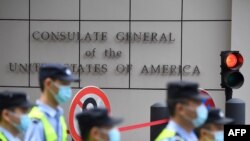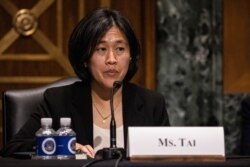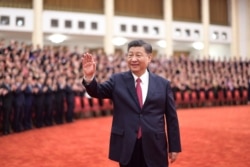The U.S. business community cheered the appointment of Katherine Tai as U.S. trade representative in the early months of the Biden administration, seeing her selection as a signal that the president wanted to get serious about addressing the country's fractured trading relationship with China. But months in, with no signal from the administration about reopening talks with China, patience among some is wearing thin.
"There's clearly a frustration at that inability to get back to having a steadier, more normal trading relationship with China," said Jake Colvin, vice president for global trade issues at the National Foreign Trade Council in Washington.
What began as an exercise in "strategic patience," as the business community waited for the White House and various agencies to come together on a strategy for approaching China, has become a state of exasperation with the lack of communication, he said.
"I think that the biggest frustration for the business community is that we don't see a road map that gets to that steadier economic relationship," he said.
'Phase 1' implementation
The Biden administration took power a little more than a year after the Trump administration signed what it called "Phase 1" of a trade deal meant to dial down tension between the U.S. and China — tension that had led to the imposition of punishing tariffs on a wide array of goods that typically move between the two countries.
The Phase 1 deal had a number of major components, one of which was a commitment from China to increase its annual imports from the U.S. by $200 billion. While sales of U.S. goods to China have increased, pandemic lockdowns throughout 2020 and extensive disruption of global trade routes in 2021 have made it difficult to get a clear measurement of China's adherence to that part of the bargain.
The deal committed China to better enforcement of intellectual property laws across various industries and to the abandonment of policies that forced companies wanting to do business in China to hand over proprietary technologies to Chinese partners. It also negotiated the removal of barriers that had prevented U.S. agricultural and financial services firms from fully competing in the Chinese market, and it created rules against currency manipulation that would give Chinese manufacturers an unfair pricing advantage over foreign competitors.
More work to do
The business community in the United States, while generally pleased with the Phase 1 agreement, viewed it as only the beginning of a process of bringing China's trade practices in line with most Western countries.
In early August, the U.S.-China Business Council organized a letter from some of the United States' largest business associations, including the U.S. Chamber of Commerce, the Business Roundtable, and the National Retail Federation, urging the Biden administration to step up efforts at ensuring China's compliance with Phase 1 commitments and exploring future talks.
"Longstanding issues remain unaddressed, including state subsidies; procurement by government and state-owned enterprises; cybersecurity, digital trade, and data governance; services issues; competition policy; regulatory data protection for new drugs, biological products, and other items; Chinese domestic standards-setting; outstanding agriculture policy issues; and continued market access barriers for U.S.-manufactured goods," the letter said.
Tariff exclusions sought
The letter also asked that the Biden administration reinstate exclusions to the tariff regime that the Trump administration put in place but allowed to expire.
Many U.S. companies have complained that the tariffs are forcing them to pay higher prices for key equipment and materials than competitors in other countries. They frequently claim that certain key manufacturing inputs are available only in China, meaning that they are powerless to seek suppliers that are not subject to sanctions.
"(W)e also urge the Administration to retroactively restore product exclusions that expired in 2020; reinstate a new, fair, and transparent tariff exclusion process; and continue negotiations with China to remove both nations' counterproductive tariffs as soon as possible," the trade groups wrote. "These steps are sorely needed to mitigate the tariffs' significant and ongoing harm to the U.S. economy, U.S. workers, and U.S. national competitiveness."
But it remains unclear how much progress U.S. businesses can expect in the near term.
USTR updates trade groups
On Tuesday, USTR Tai met virtually with the U.S. Chamber China Center Advisory Board and the leadership of the US-China Business Council to discuss the administration’s progress on developing a strategy for addressing questions about future U.S. trade with China.
According to a readout of the meeting released by the Office of the USTR late Tuesday evening, “Ambassador Tai acknowledged the significance of the U.S. trade relationship with China, and emphasized the importance of a thorough strategic assessment to craft resilient trade policy that supports the Administration’s efforts to create jobs, raise wages, and strengthen our communities... The Ambassador also reiterated USTR’s commitment to addressing China’s unfair trade policies and non-market practices that undermine American businesses and workers.”
In a statement also issued late Tuesday Myron Brilliant, executive vice president and head of international at the U.S. Chamber of Commerce, said, “The Advisory Board noted that China is and will remain a critical market for American business,” “The Board had a positive and candid conversation with Ambassador Tai, reiterating the commitment of the business community to work with the administration to achieve a trade policy with China that lifts all stakeholders, is grounded in a desire for market-driven outcomes, and accounts for the unique aspects of U.S.-China relations.”
Neither readout gave any indication of when the administration expects to conclude its strategic assessment. It remains unclear how much progress U.S. businesses can expect in the near term.
Political pitfalls
"While Afghanistan will dominate policymaking for weeks, if not longer, the Biden administration faces increasing pressure to present some sort of China policy framework," Derek Scissors, a senior fellow at the American Enterprise Institute, told VOA. "They would face a great deal of criticism if they started meaningful negotiations with China without such a framework."
However, he said, there's not much political upside for the administration to fast-track talks with Beijing.
"The main obstacle to the U.S. talking with China about economic issues is that no talks with China about economic issues have ever benefited the country," Scissors said. "Some companies, yes; the U.S. as a whole, no."
Gary Hufbauer, a senior fellow at the Peterson Institute for International Economics, told VOA that he agrees that internal politics — in both countries — present the biggest obstacle to restarting the trade negotiations.
"If President Biden were to decide to restart the trade talks, he will be accused by his Republican opponents in Congress of appeasing China and being weak on China. So, looking forward to the November 2022 elections, he does not want to have that political burden," he said.
In China, meanwhile, President Xi Jinping has recently been stressing the need to achieve "common prosperity," a term widely understood to signal some degree of income redistribution. This may lead to lower demand for luxury imports, as Chinese who have benefited the most from the country's strong growth in recent years become more cautious about flaunting their wealth.
At the same time, Xi's government is signaling that it may not be very interested in being pulled further into Western ways of doing business. For example, regulators have cracked down sharply on Chinese businesses looking to list their shares on Western stock exchanges, which require much more transparency than Beijing is willing to grant to firms that are often closely tied to the government.
"In China," Hufbauer added, "what seems to be happening is that President Xi is benefiting from a nationalistic response, and he's making the most of a very kind of return to the Mao era of a quite strident response against the United States."
Yinan Wang of VOA's Mandarin Service contributed reporting to this story.







